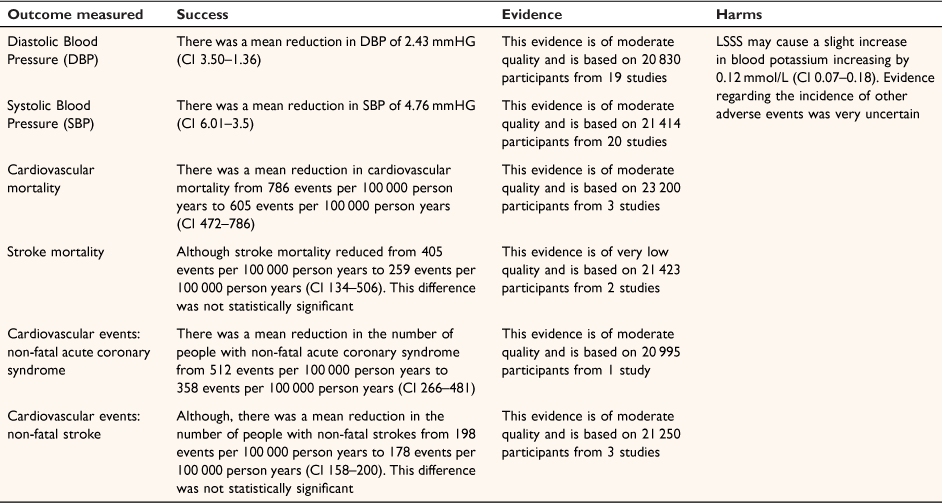Low-sodium salt substitutes (LSSS) for cardiovascular health: do they work?
Vanessa Jordan 1 *
1 *
1 Department of Obstetrics and Gynaecology, University of Auckland, Grafton, Auckland, New Zealand.
Journal of Primary Health Care 14(3) 286-287 https://doi.org/10.1071/HC22108
Published: 16 September 2022
© 2022 The Author(s) (or their employer(s)). Published by CSIRO Publishing on behalf of The Royal New Zealand College of General Practitioners. This is an open access article distributed under the Creative Commons Attribution-NonCommercial-NoDerivatives 4.0 International License (CC BY-NC-ND)
Cochrane Review: Brand A, Visser ME, Schoonees A, Naude CE. Replacing salt with low-sodium salt substitutes (LSSS) for cardiovascular health in adults, children and pregnant women. Cochrane Database of Systematic Reviews 2022, Issue 8, Art. No. CD015207. doi: 10.1002/14651858.CD015207.1
Background
Hypertension is a known public health problem that affects both the economic developed and developing world and effects somewhere between 25 and 33% of the adult population.2 It is one of the leading factors attributing to global mortality and is the third highest risk factor for the global burden of disease.3 The World Health Organisation (WHO) states that a population level reduction in sodium intake is strongly recommended in order to reduce blood pressure and cardiovascular disease.4 The question here is, does LSSS help to reduce sodium intake?
Clinical bottom line
Using LSSS will reduce both diastolic and systolic blood pressure which in turn results in a reduction of cardiovascular mortality and the number of cardiovascular non-fatal events.1 The reduction shown here was clinically relatively small (systolic blood pressure reduction of 4.76 mmHg) at an individual level but at a population level a reduction of even 1 mmHg in SBP can prevent substantial numbers of cardiac events (Table 1).5

|
References
[1] Brand A, Visser ME, Schoonees A, et al. Replacing salt with low‐sodium salt substitutes (LSSS) for cardiovascular health in adults, children and pregnant women. Cochrane Database Syst Rev 2022; Art. No. CD015207| Replacing salt with low‐sodium salt substitutes (LSSS) for cardiovascular health in adults, children and pregnant women.Crossref | GoogleScholarGoogle Scholar |
[2] Kearney PM, Whelton M, Reynolds K, et al. Worldwide prevalence of hypertension: a systematic review. J Hypertens 2004; 22 11–9.
| Worldwide prevalence of hypertension: a systematic review.Crossref | GoogleScholarGoogle Scholar |
[3] Ezzati M, Lopez AD, Rodgers A, et al. Selected major risk factors and global and regional burden of disease. Lancet 2002; 360 1347–60.
| Selected major risk factors and global and regional burden of disease.Crossref | GoogleScholarGoogle Scholar |
[4] World Health Organisation. Guideline: sodium intake for adults and children. 2012. Available at https://www.who.int/publications/i/item/9789241504836 (Accessed 30 August 2022)
[5] Hardy ST, Loehr LR, Butler KR, et al. Reducing the blood pressure–related burden of cardiovascular disease: impact of achievable improvements in blood pressure prevention and control. J Am Heart Assoc 2015; 4 e002276
| Reducing the blood pressure–related burden of cardiovascular disease: impact of achievable improvements in blood pressure prevention and control.Crossref | GoogleScholarGoogle Scholar |


